Analysis of Mr. Kwon's Neurological Case: Care and Management
VerifiedAdded on 2023/01/07
|8
|2485
|100
Case Study
AI Summary
This case study examines the neurological condition of Mr. Kwon, focusing on his right-sided hemi-paralysis, aphasia, and other health issues. The assignment begins with an analysis of the assessment findings, including vital signs and CT scan results, which suggest a left cerebrovascular accident. It then develops an interprofessional care and management plan addressing ethical and legal implications, person-centered care, and health promotion strategies. The plan emphasizes the importance of ethical considerations, patient-centered approaches, and promoting healthy habits like avoiding smoking. Finally, the assignment justifies discharge plan decisions by referencing relevant literature and ensuring the patient's stable condition and ability to manage their health at home. The conclusion highlights the significance of careful neurological care and the importance of accurate diagnosis and treatment planning for improving patient outcomes.
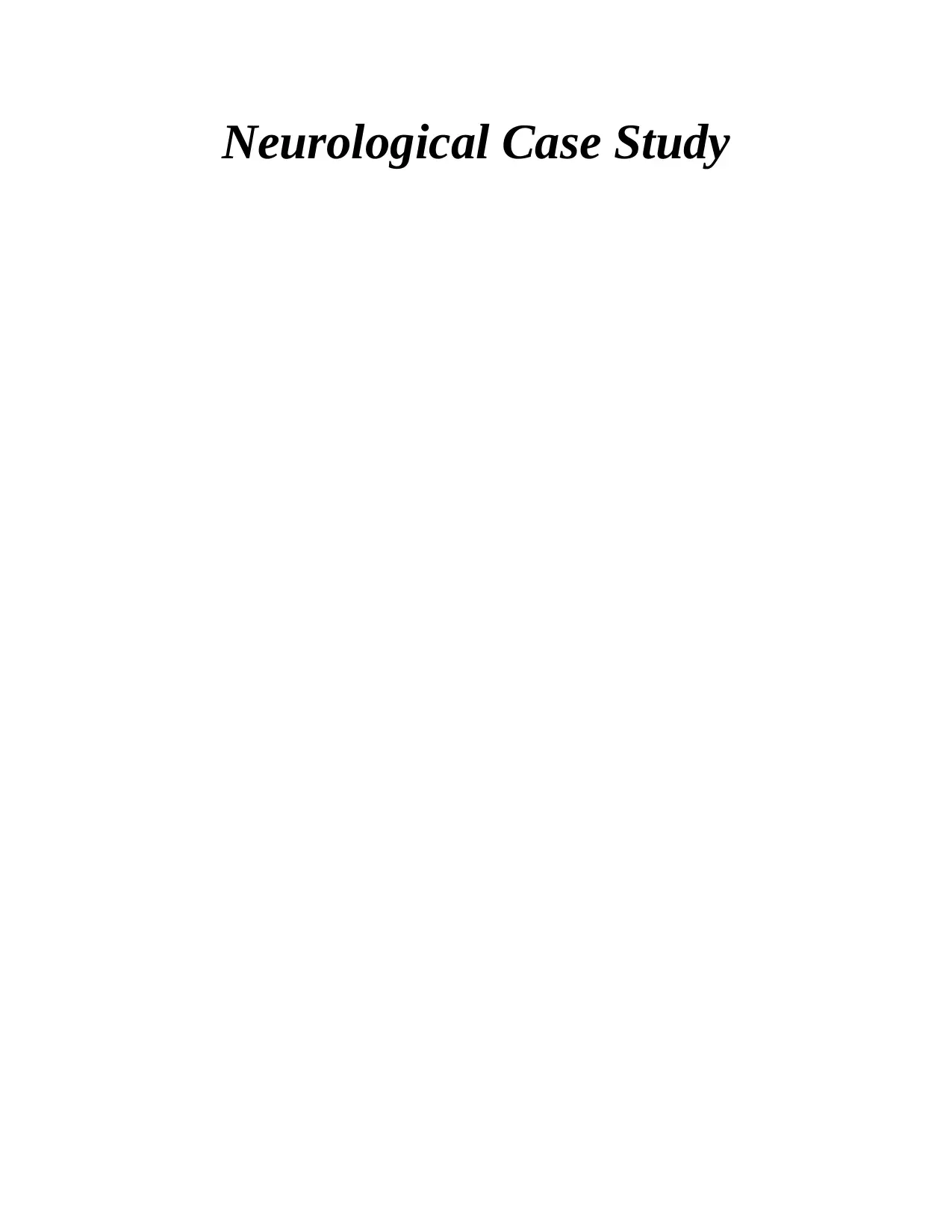
Neurological Case Study
Paraphrase This Document
Need a fresh take? Get an instant paraphrase of this document with our AI Paraphraser
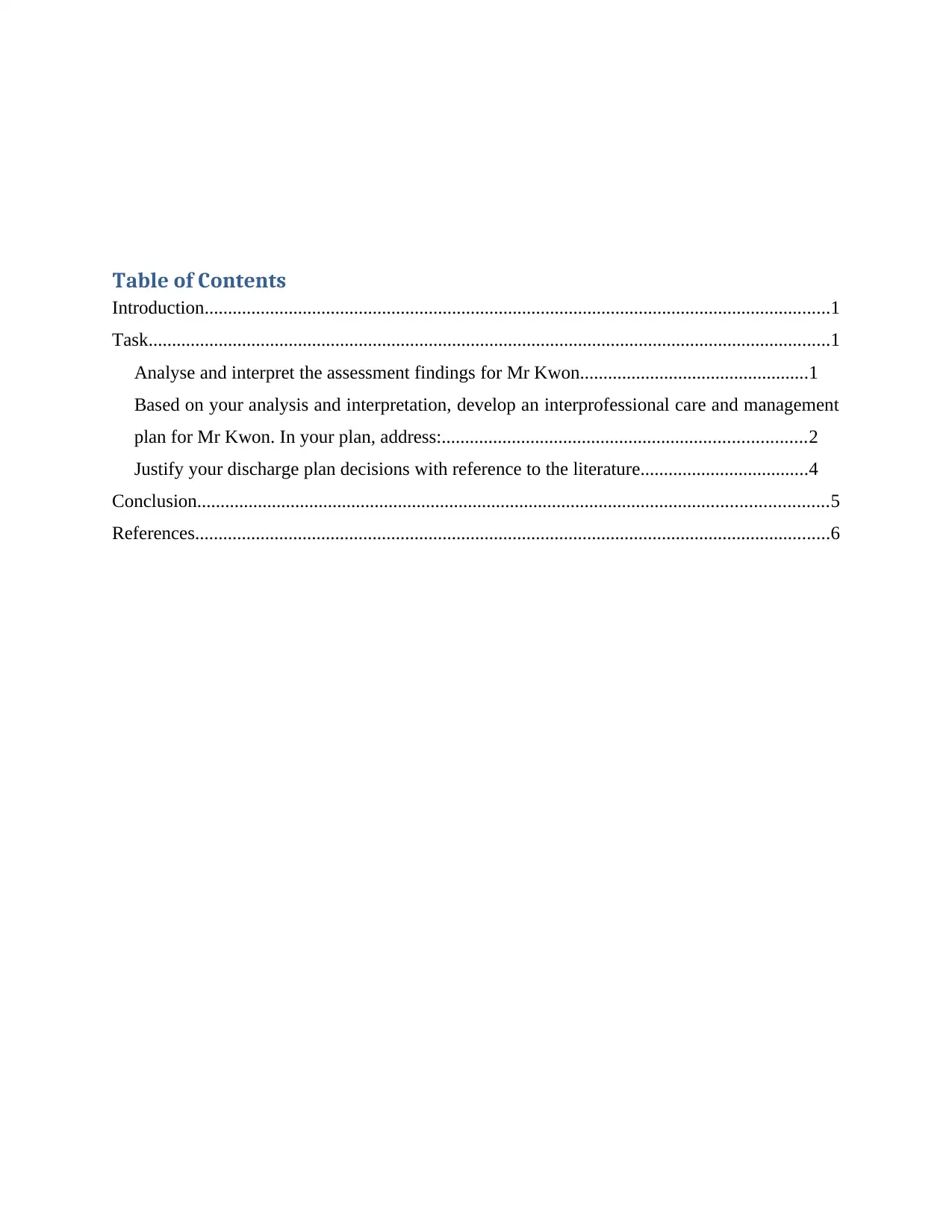
Table of Contents
Introduction......................................................................................................................................1
Task..................................................................................................................................................1
Analyse and interpret the assessment findings for Mr Kwon.................................................1
Based on your analysis and interpretation, develop an interprofessional care and management
plan for Mr Kwon. In your plan, address:..............................................................................2
Justify your discharge plan decisions with reference to the literature....................................4
Conclusion.......................................................................................................................................5
References........................................................................................................................................6
Introduction......................................................................................................................................1
Task..................................................................................................................................................1
Analyse and interpret the assessment findings for Mr Kwon.................................................1
Based on your analysis and interpretation, develop an interprofessional care and management
plan for Mr Kwon. In your plan, address:..............................................................................2
Justify your discharge plan decisions with reference to the literature....................................4
Conclusion.......................................................................................................................................5
References........................................................................................................................................6
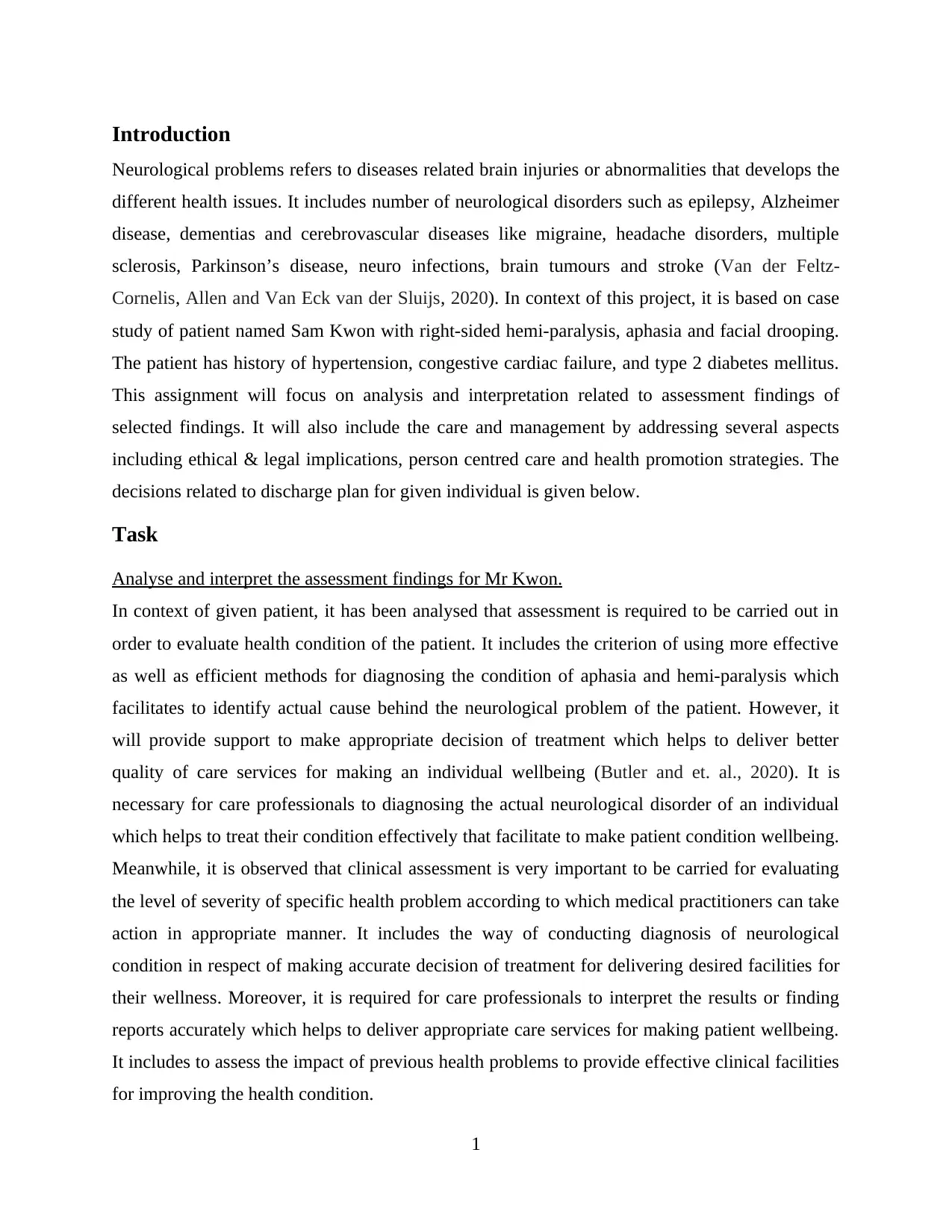
Introduction
Neurological problems refers to diseases related brain injuries or abnormalities that develops the
different health issues. It includes number of neurological disorders such as epilepsy, Alzheimer
disease, dementias and cerebrovascular diseases like migraine, headache disorders, multiple
sclerosis, Parkinson’s disease, neuro infections, brain tumours and stroke (Van der Feltz‐
Cornelis, Allen and Van Eck van der Sluijs, 2020). In context of this project, it is based on case
study of patient named Sam Kwon with right-sided hemi-paralysis, aphasia and facial drooping.
The patient has history of hypertension, congestive cardiac failure, and type 2 diabetes mellitus.
This assignment will focus on analysis and interpretation related to assessment findings of
selected findings. It will also include the care and management by addressing several aspects
including ethical & legal implications, person centred care and health promotion strategies. The
decisions related to discharge plan for given individual is given below.
Task
Analyse and interpret the assessment findings for Mr Kwon.
In context of given patient, it has been analysed that assessment is required to be carried out in
order to evaluate health condition of the patient. It includes the criterion of using more effective
as well as efficient methods for diagnosing the condition of aphasia and hemi-paralysis which
facilitates to identify actual cause behind the neurological problem of the patient. However, it
will provide support to make appropriate decision of treatment which helps to deliver better
quality of care services for making an individual wellbeing (Butler and et. al., 2020). It is
necessary for care professionals to diagnosing the actual neurological disorder of an individual
which helps to treat their condition effectively that facilitate to make patient condition wellbeing.
Meanwhile, it is observed that clinical assessment is very important to be carried for evaluating
the level of severity of specific health problem according to which medical practitioners can take
action in appropriate manner. It includes the way of conducting diagnosis of neurological
condition in respect of making accurate decision of treatment for delivering desired facilities for
their wellness. Moreover, it is required for care professionals to interpret the results or finding
reports accurately which helps to deliver appropriate care services for making patient wellbeing.
It includes to assess the impact of previous health problems to provide effective clinical facilities
for improving the health condition.
1
Neurological problems refers to diseases related brain injuries or abnormalities that develops the
different health issues. It includes number of neurological disorders such as epilepsy, Alzheimer
disease, dementias and cerebrovascular diseases like migraine, headache disorders, multiple
sclerosis, Parkinson’s disease, neuro infections, brain tumours and stroke (Van der Feltz‐
Cornelis, Allen and Van Eck van der Sluijs, 2020). In context of this project, it is based on case
study of patient named Sam Kwon with right-sided hemi-paralysis, aphasia and facial drooping.
The patient has history of hypertension, congestive cardiac failure, and type 2 diabetes mellitus.
This assignment will focus on analysis and interpretation related to assessment findings of
selected findings. It will also include the care and management by addressing several aspects
including ethical & legal implications, person centred care and health promotion strategies. The
decisions related to discharge plan for given individual is given below.
Task
Analyse and interpret the assessment findings for Mr Kwon.
In context of given patient, it has been analysed that assessment is required to be carried out in
order to evaluate health condition of the patient. It includes the criterion of using more effective
as well as efficient methods for diagnosing the condition of aphasia and hemi-paralysis which
facilitates to identify actual cause behind the neurological problem of the patient. However, it
will provide support to make appropriate decision of treatment which helps to deliver better
quality of care services for making an individual wellbeing (Butler and et. al., 2020). It is
necessary for care professionals to diagnosing the actual neurological disorder of an individual
which helps to treat their condition effectively that facilitate to make patient condition wellbeing.
Meanwhile, it is observed that clinical assessment is very important to be carried for evaluating
the level of severity of specific health problem according to which medical practitioners can take
action in appropriate manner. It includes the way of conducting diagnosis of neurological
condition in respect of making accurate decision of treatment for delivering desired facilities for
their wellness. Moreover, it is required for care professionals to interpret the results or finding
reports accurately which helps to deliver appropriate care services for making patient wellbeing.
It includes to assess the impact of previous health problems to provide effective clinical facilities
for improving the health condition.
1
⊘ This is a preview!⊘
Do you want full access?
Subscribe today to unlock all pages.

Trusted by 1+ million students worldwide
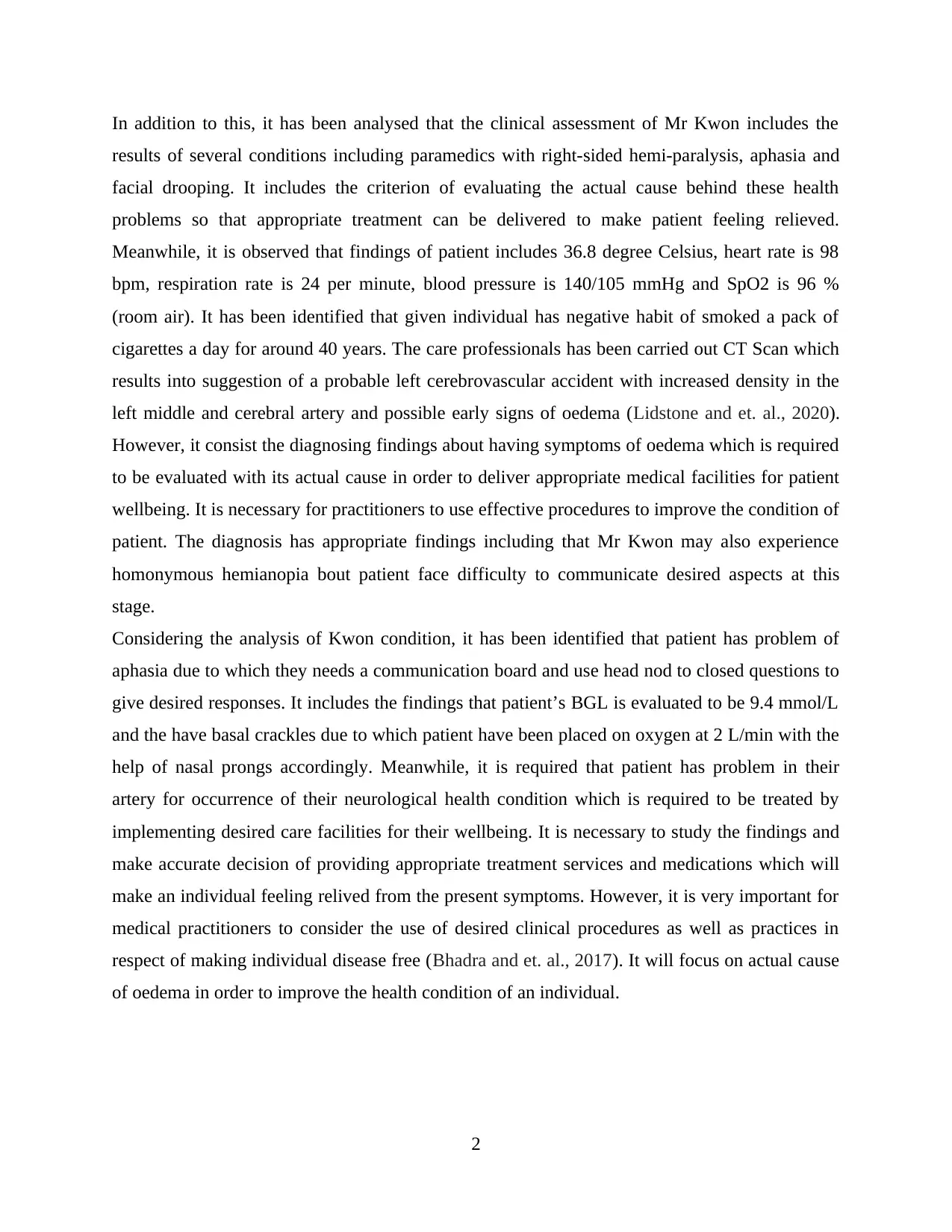
In addition to this, it has been analysed that the clinical assessment of Mr Kwon includes the
results of several conditions including paramedics with right-sided hemi-paralysis, aphasia and
facial drooping. It includes the criterion of evaluating the actual cause behind these health
problems so that appropriate treatment can be delivered to make patient feeling relieved.
Meanwhile, it is observed that findings of patient includes 36.8 degree Celsius, heart rate is 98
bpm, respiration rate is 24 per minute, blood pressure is 140/105 mmHg and SpO2 is 96 %
(room air). It has been identified that given individual has negative habit of smoked a pack of
cigarettes a day for around 40 years. The care professionals has been carried out CT Scan which
results into suggestion of a probable left cerebrovascular accident with increased density in the
left middle and cerebral artery and possible early signs of oedema (Lidstone and et. al., 2020).
However, it consist the diagnosing findings about having symptoms of oedema which is required
to be evaluated with its actual cause in order to deliver appropriate medical facilities for patient
wellbeing. It is necessary for practitioners to use effective procedures to improve the condition of
patient. The diagnosis has appropriate findings including that Mr Kwon may also experience
homonymous hemianopia bout patient face difficulty to communicate desired aspects at this
stage.
Considering the analysis of Kwon condition, it has been identified that patient has problem of
aphasia due to which they needs a communication board and use head nod to closed questions to
give desired responses. It includes the findings that patient’s BGL is evaluated to be 9.4 mmol/L
and the have basal crackles due to which patient have been placed on oxygen at 2 L/min with the
help of nasal prongs accordingly. Meanwhile, it is required that patient has problem in their
artery for occurrence of their neurological health condition which is required to be treated by
implementing desired care facilities for their wellbeing. It is necessary to study the findings and
make accurate decision of providing appropriate treatment services and medications which will
make an individual feeling relived from the present symptoms. However, it is very important for
medical practitioners to consider the use of desired clinical procedures as well as practices in
respect of making individual disease free (Bhadra and et. al., 2017). It will focus on actual cause
of oedema in order to improve the health condition of an individual.
2
results of several conditions including paramedics with right-sided hemi-paralysis, aphasia and
facial drooping. It includes the criterion of evaluating the actual cause behind these health
problems so that appropriate treatment can be delivered to make patient feeling relieved.
Meanwhile, it is observed that findings of patient includes 36.8 degree Celsius, heart rate is 98
bpm, respiration rate is 24 per minute, blood pressure is 140/105 mmHg and SpO2 is 96 %
(room air). It has been identified that given individual has negative habit of smoked a pack of
cigarettes a day for around 40 years. The care professionals has been carried out CT Scan which
results into suggestion of a probable left cerebrovascular accident with increased density in the
left middle and cerebral artery and possible early signs of oedema (Lidstone and et. al., 2020).
However, it consist the diagnosing findings about having symptoms of oedema which is required
to be evaluated with its actual cause in order to deliver appropriate medical facilities for patient
wellbeing. It is necessary for practitioners to use effective procedures to improve the condition of
patient. The diagnosis has appropriate findings including that Mr Kwon may also experience
homonymous hemianopia bout patient face difficulty to communicate desired aspects at this
stage.
Considering the analysis of Kwon condition, it has been identified that patient has problem of
aphasia due to which they needs a communication board and use head nod to closed questions to
give desired responses. It includes the findings that patient’s BGL is evaluated to be 9.4 mmol/L
and the have basal crackles due to which patient have been placed on oxygen at 2 L/min with the
help of nasal prongs accordingly. Meanwhile, it is required that patient has problem in their
artery for occurrence of their neurological health condition which is required to be treated by
implementing desired care facilities for their wellbeing. It is necessary to study the findings and
make accurate decision of providing appropriate treatment services and medications which will
make an individual feeling relived from the present symptoms. However, it is very important for
medical practitioners to consider the use of desired clinical procedures as well as practices in
respect of making individual disease free (Bhadra and et. al., 2017). It will focus on actual cause
of oedema in order to improve the health condition of an individual.
2
Paraphrase This Document
Need a fresh take? Get an instant paraphrase of this document with our AI Paraphraser
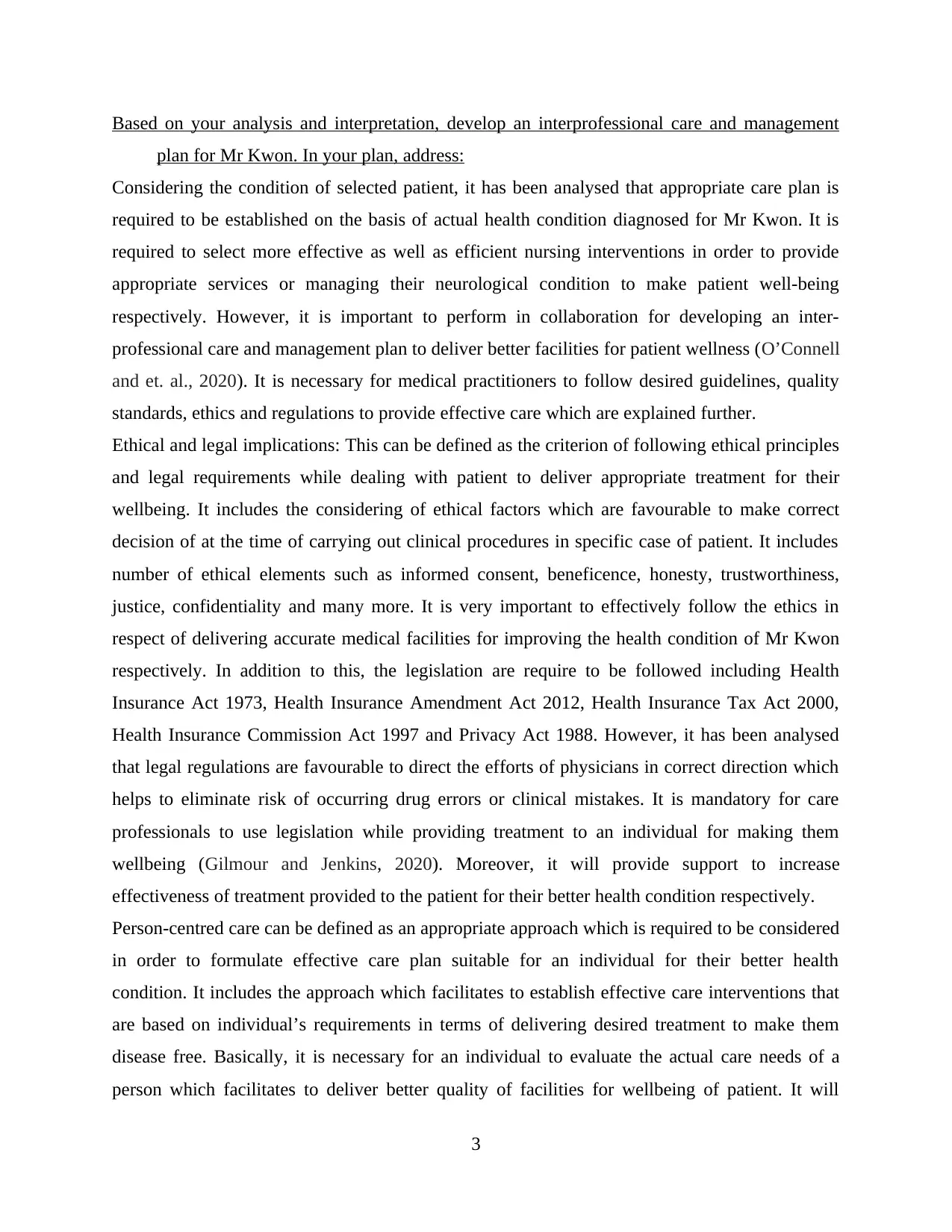
Based on your analysis and interpretation, develop an interprofessional care and management
plan for Mr Kwon. In your plan, address:
Considering the condition of selected patient, it has been analysed that appropriate care plan is
required to be established on the basis of actual health condition diagnosed for Mr Kwon. It is
required to select more effective as well as efficient nursing interventions in order to provide
appropriate services or managing their neurological condition to make patient well-being
respectively. However, it is important to perform in collaboration for developing an inter-
professional care and management plan to deliver better facilities for patient wellness (O’Connell
and et. al., 2020). It is necessary for medical practitioners to follow desired guidelines, quality
standards, ethics and regulations to provide effective care which are explained further.
Ethical and legal implications: This can be defined as the criterion of following ethical principles
and legal requirements while dealing with patient to deliver appropriate treatment for their
wellbeing. It includes the considering of ethical factors which are favourable to make correct
decision of at the time of carrying out clinical procedures in specific case of patient. It includes
number of ethical elements such as informed consent, beneficence, honesty, trustworthiness,
justice, confidentiality and many more. It is very important to effectively follow the ethics in
respect of delivering accurate medical facilities for improving the health condition of Mr Kwon
respectively. In addition to this, the legislation are require to be followed including Health
Insurance Act 1973, Health Insurance Amendment Act 2012, Health Insurance Tax Act 2000,
Health Insurance Commission Act 1997 and Privacy Act 1988. However, it has been analysed
that legal regulations are favourable to direct the efforts of physicians in correct direction which
helps to eliminate risk of occurring drug errors or clinical mistakes. It is mandatory for care
professionals to use legislation while providing treatment to an individual for making them
wellbeing (Gilmour and Jenkins, 2020). Moreover, it will provide support to increase
effectiveness of treatment provided to the patient for their better health condition respectively.
Person-centred care can be defined as an appropriate approach which is required to be considered
in order to formulate effective care plan suitable for an individual for their better health
condition. It includes the approach which facilitates to establish effective care interventions that
are based on individual’s requirements in terms of delivering desired treatment to make them
disease free. Basically, it is necessary for an individual to evaluate the actual care needs of a
person which facilitates to deliver better quality of facilities for wellbeing of patient. It will
3
plan for Mr Kwon. In your plan, address:
Considering the condition of selected patient, it has been analysed that appropriate care plan is
required to be established on the basis of actual health condition diagnosed for Mr Kwon. It is
required to select more effective as well as efficient nursing interventions in order to provide
appropriate services or managing their neurological condition to make patient well-being
respectively. However, it is important to perform in collaboration for developing an inter-
professional care and management plan to deliver better facilities for patient wellness (O’Connell
and et. al., 2020). It is necessary for medical practitioners to follow desired guidelines, quality
standards, ethics and regulations to provide effective care which are explained further.
Ethical and legal implications: This can be defined as the criterion of following ethical principles
and legal requirements while dealing with patient to deliver appropriate treatment for their
wellbeing. It includes the considering of ethical factors which are favourable to make correct
decision of at the time of carrying out clinical procedures in specific case of patient. It includes
number of ethical elements such as informed consent, beneficence, honesty, trustworthiness,
justice, confidentiality and many more. It is very important to effectively follow the ethics in
respect of delivering accurate medical facilities for improving the health condition of Mr Kwon
respectively. In addition to this, the legislation are require to be followed including Health
Insurance Act 1973, Health Insurance Amendment Act 2012, Health Insurance Tax Act 2000,
Health Insurance Commission Act 1997 and Privacy Act 1988. However, it has been analysed
that legal regulations are favourable to direct the efforts of physicians in correct direction which
helps to eliminate risk of occurring drug errors or clinical mistakes. It is mandatory for care
professionals to use legislation while providing treatment to an individual for making them
wellbeing (Gilmour and Jenkins, 2020). Moreover, it will provide support to increase
effectiveness of treatment provided to the patient for their better health condition respectively.
Person-centred care can be defined as an appropriate approach which is required to be considered
in order to formulate effective care plan suitable for an individual for their better health
condition. It includes the approach which facilitates to establish effective care interventions that
are based on individual’s requirements in terms of delivering desired treatment to make them
disease free. Basically, it is necessary for an individual to evaluate the actual care needs of a
person which facilitates to deliver better quality of facilities for wellbeing of patient. It will
3
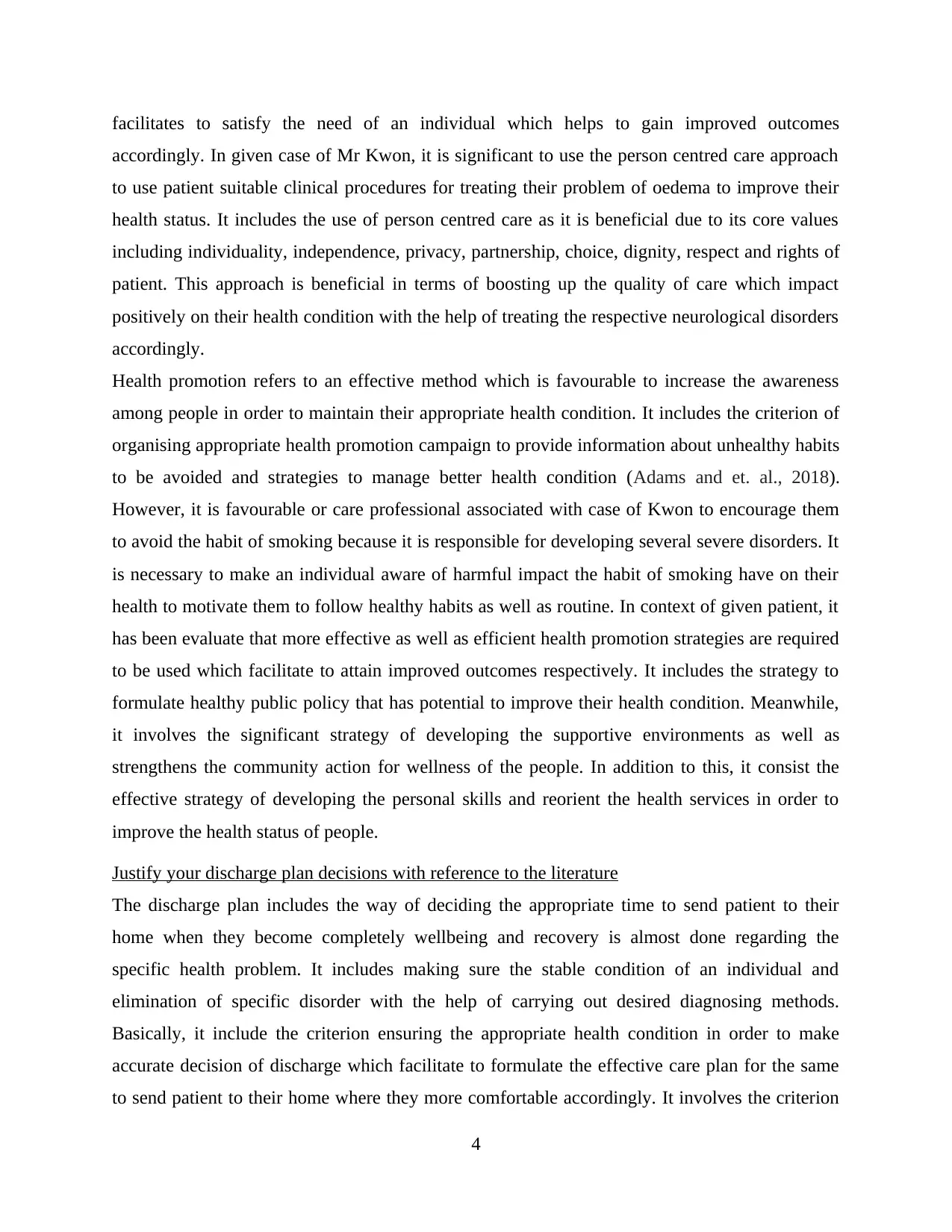
facilitates to satisfy the need of an individual which helps to gain improved outcomes
accordingly. In given case of Mr Kwon, it is significant to use the person centred care approach
to use patient suitable clinical procedures for treating their problem of oedema to improve their
health status. It includes the use of person centred care as it is beneficial due to its core values
including individuality, independence, privacy, partnership, choice, dignity, respect and rights of
patient. This approach is beneficial in terms of boosting up the quality of care which impact
positively on their health condition with the help of treating the respective neurological disorders
accordingly.
Health promotion refers to an effective method which is favourable to increase the awareness
among people in order to maintain their appropriate health condition. It includes the criterion of
organising appropriate health promotion campaign to provide information about unhealthy habits
to be avoided and strategies to manage better health condition (Adams and et. al., 2018).
However, it is favourable or care professional associated with case of Kwon to encourage them
to avoid the habit of smoking because it is responsible for developing several severe disorders. It
is necessary to make an individual aware of harmful impact the habit of smoking have on their
health to motivate them to follow healthy habits as well as routine. In context of given patient, it
has been evaluate that more effective as well as efficient health promotion strategies are required
to be used which facilitate to attain improved outcomes respectively. It includes the strategy to
formulate healthy public policy that has potential to improve their health condition. Meanwhile,
it involves the significant strategy of developing the supportive environments as well as
strengthens the community action for wellness of the people. In addition to this, it consist the
effective strategy of developing the personal skills and reorient the health services in order to
improve the health status of people.
Justify your discharge plan decisions with reference to the literature
The discharge plan includes the way of deciding the appropriate time to send patient to their
home when they become completely wellbeing and recovery is almost done regarding the
specific health problem. It includes making sure the stable condition of an individual and
elimination of specific disorder with the help of carrying out desired diagnosing methods.
Basically, it include the criterion ensuring the appropriate health condition in order to make
accurate decision of discharge which facilitate to formulate the effective care plan for the same
to send patient to their home where they more comfortable accordingly. It involves the criterion
4
accordingly. In given case of Mr Kwon, it is significant to use the person centred care approach
to use patient suitable clinical procedures for treating their problem of oedema to improve their
health status. It includes the use of person centred care as it is beneficial due to its core values
including individuality, independence, privacy, partnership, choice, dignity, respect and rights of
patient. This approach is beneficial in terms of boosting up the quality of care which impact
positively on their health condition with the help of treating the respective neurological disorders
accordingly.
Health promotion refers to an effective method which is favourable to increase the awareness
among people in order to maintain their appropriate health condition. It includes the criterion of
organising appropriate health promotion campaign to provide information about unhealthy habits
to be avoided and strategies to manage better health condition (Adams and et. al., 2018).
However, it is favourable or care professional associated with case of Kwon to encourage them
to avoid the habit of smoking because it is responsible for developing several severe disorders. It
is necessary to make an individual aware of harmful impact the habit of smoking have on their
health to motivate them to follow healthy habits as well as routine. In context of given patient, it
has been evaluate that more effective as well as efficient health promotion strategies are required
to be used which facilitate to attain improved outcomes respectively. It includes the strategy to
formulate healthy public policy that has potential to improve their health condition. Meanwhile,
it involves the significant strategy of developing the supportive environments as well as
strengthens the community action for wellness of the people. In addition to this, it consist the
effective strategy of developing the personal skills and reorient the health services in order to
improve the health status of people.
Justify your discharge plan decisions with reference to the literature
The discharge plan includes the way of deciding the appropriate time to send patient to their
home when they become completely wellbeing and recovery is almost done regarding the
specific health problem. It includes making sure the stable condition of an individual and
elimination of specific disorder with the help of carrying out desired diagnosing methods.
Basically, it include the criterion ensuring the appropriate health condition in order to make
accurate decision of discharge which facilitate to formulate the effective care plan for the same
to send patient to their home where they more comfortable accordingly. It involves the criterion
4
⊘ This is a preview!⊘
Do you want full access?
Subscribe today to unlock all pages.

Trusted by 1+ million students worldwide
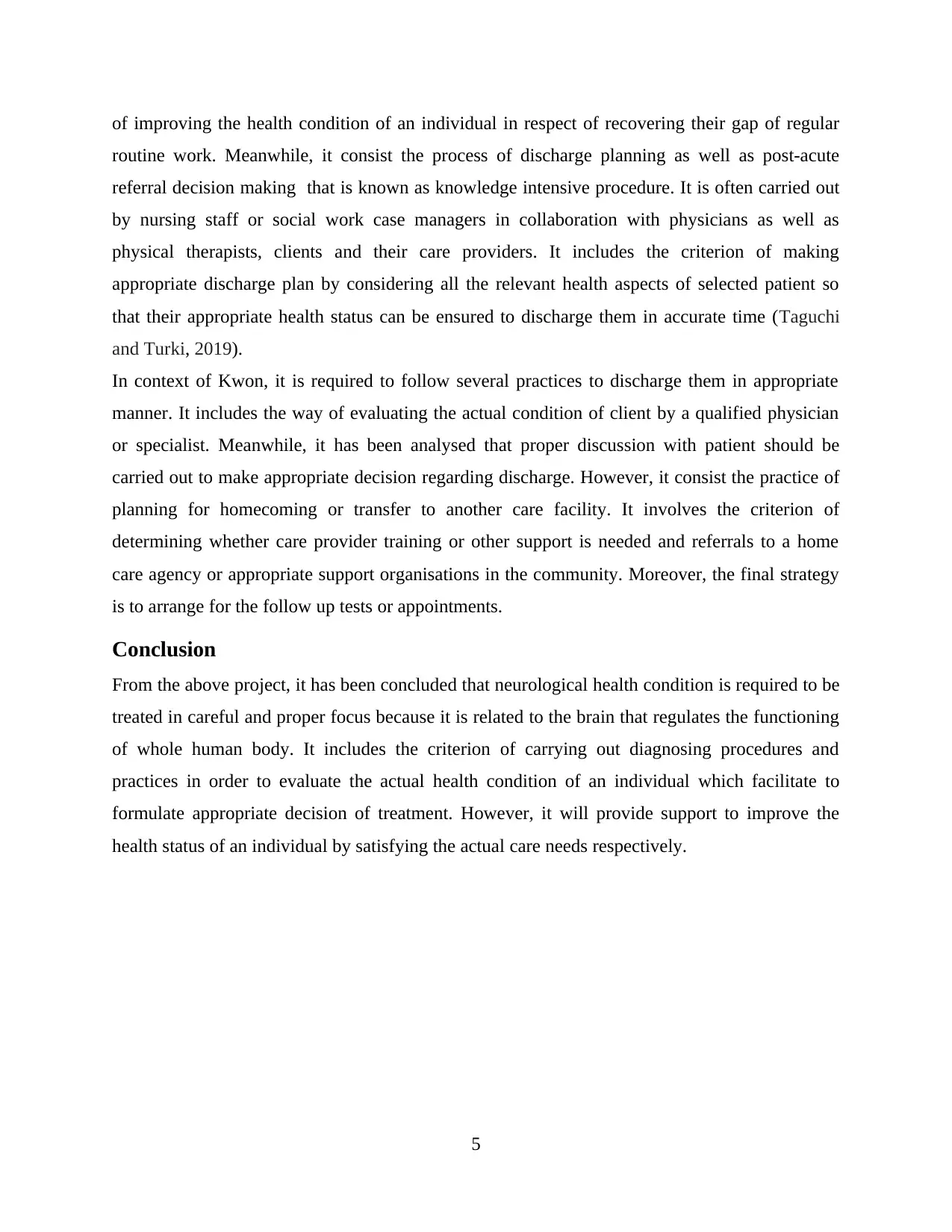
of improving the health condition of an individual in respect of recovering their gap of regular
routine work. Meanwhile, it consist the process of discharge planning as well as post-acute
referral decision making that is known as knowledge intensive procedure. It is often carried out
by nursing staff or social work case managers in collaboration with physicians as well as
physical therapists, clients and their care providers. It includes the criterion of making
appropriate discharge plan by considering all the relevant health aspects of selected patient so
that their appropriate health status can be ensured to discharge them in accurate time (Taguchi
and Turki, 2019).
In context of Kwon, it is required to follow several practices to discharge them in appropriate
manner. It includes the way of evaluating the actual condition of client by a qualified physician
or specialist. Meanwhile, it has been analysed that proper discussion with patient should be
carried out to make appropriate decision regarding discharge. However, it consist the practice of
planning for homecoming or transfer to another care facility. It involves the criterion of
determining whether care provider training or other support is needed and referrals to a home
care agency or appropriate support organisations in the community. Moreover, the final strategy
is to arrange for the follow up tests or appointments.
Conclusion
From the above project, it has been concluded that neurological health condition is required to be
treated in careful and proper focus because it is related to the brain that regulates the functioning
of whole human body. It includes the criterion of carrying out diagnosing procedures and
practices in order to evaluate the actual health condition of an individual which facilitate to
formulate appropriate decision of treatment. However, it will provide support to improve the
health status of an individual by satisfying the actual care needs respectively.
5
routine work. Meanwhile, it consist the process of discharge planning as well as post-acute
referral decision making that is known as knowledge intensive procedure. It is often carried out
by nursing staff or social work case managers in collaboration with physicians as well as
physical therapists, clients and their care providers. It includes the criterion of making
appropriate discharge plan by considering all the relevant health aspects of selected patient so
that their appropriate health status can be ensured to discharge them in accurate time (Taguchi
and Turki, 2019).
In context of Kwon, it is required to follow several practices to discharge them in appropriate
manner. It includes the way of evaluating the actual condition of client by a qualified physician
or specialist. Meanwhile, it has been analysed that proper discussion with patient should be
carried out to make appropriate decision regarding discharge. However, it consist the practice of
planning for homecoming or transfer to another care facility. It involves the criterion of
determining whether care provider training or other support is needed and referrals to a home
care agency or appropriate support organisations in the community. Moreover, the final strategy
is to arrange for the follow up tests or appointments.
Conclusion
From the above project, it has been concluded that neurological health condition is required to be
treated in careful and proper focus because it is related to the brain that regulates the functioning
of whole human body. It includes the criterion of carrying out diagnosing procedures and
practices in order to evaluate the actual health condition of an individual which facilitate to
formulate appropriate decision of treatment. However, it will provide support to improve the
health status of an individual by satisfying the actual care needs respectively.
5
Paraphrase This Document
Need a fresh take? Get an instant paraphrase of this document with our AI Paraphraser
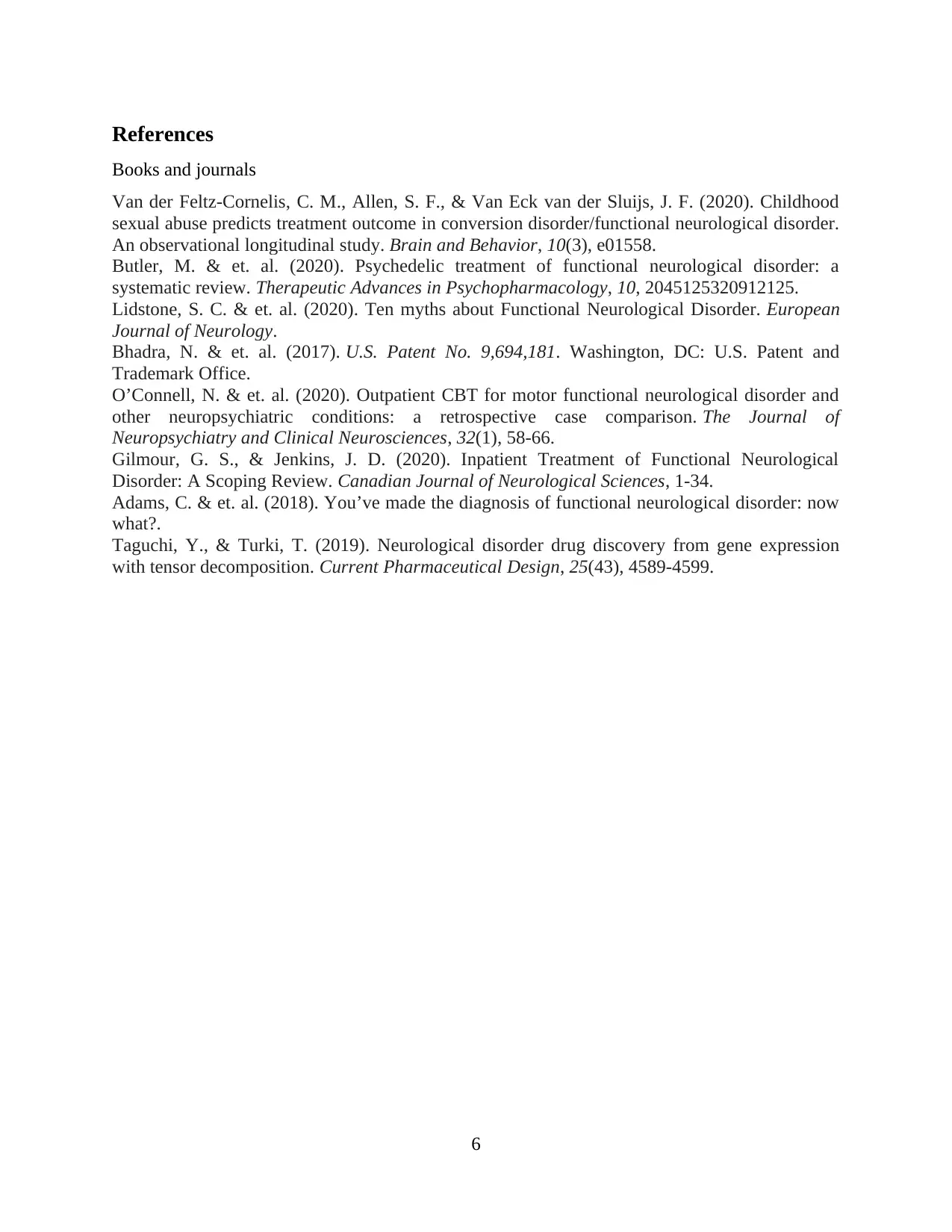
References
Books and journals
Van der Feltz‐Cornelis, C. M., Allen, S. F., & Van Eck van der Sluijs, J. F. (2020). Childhood
sexual abuse predicts treatment outcome in conversion disorder/functional neurological disorder.
An observational longitudinal study. Brain and Behavior, 10(3), e01558.
Butler, M. & et. al. (2020). Psychedelic treatment of functional neurological disorder: a
systematic review. Therapeutic Advances in Psychopharmacology, 10, 2045125320912125.
Lidstone, S. C. & et. al. (2020). Ten myths about Functional Neurological Disorder. European
Journal of Neurology.
Bhadra, N. & et. al. (2017). U.S. Patent No. 9,694,181. Washington, DC: U.S. Patent and
Trademark Office.
O’Connell, N. & et. al. (2020). Outpatient CBT for motor functional neurological disorder and
other neuropsychiatric conditions: a retrospective case comparison. The Journal of
Neuropsychiatry and Clinical Neurosciences, 32(1), 58-66.
Gilmour, G. S., & Jenkins, J. D. (2020). Inpatient Treatment of Functional Neurological
Disorder: A Scoping Review. Canadian Journal of Neurological Sciences, 1-34.
Adams, C. & et. al. (2018). You’ve made the diagnosis of functional neurological disorder: now
what?.
Taguchi, Y., & Turki, T. (2019). Neurological disorder drug discovery from gene expression
with tensor decomposition. Current Pharmaceutical Design, 25(43), 4589-4599.
6
Books and journals
Van der Feltz‐Cornelis, C. M., Allen, S. F., & Van Eck van der Sluijs, J. F. (2020). Childhood
sexual abuse predicts treatment outcome in conversion disorder/functional neurological disorder.
An observational longitudinal study. Brain and Behavior, 10(3), e01558.
Butler, M. & et. al. (2020). Psychedelic treatment of functional neurological disorder: a
systematic review. Therapeutic Advances in Psychopharmacology, 10, 2045125320912125.
Lidstone, S. C. & et. al. (2020). Ten myths about Functional Neurological Disorder. European
Journal of Neurology.
Bhadra, N. & et. al. (2017). U.S. Patent No. 9,694,181. Washington, DC: U.S. Patent and
Trademark Office.
O’Connell, N. & et. al. (2020). Outpatient CBT for motor functional neurological disorder and
other neuropsychiatric conditions: a retrospective case comparison. The Journal of
Neuropsychiatry and Clinical Neurosciences, 32(1), 58-66.
Gilmour, G. S., & Jenkins, J. D. (2020). Inpatient Treatment of Functional Neurological
Disorder: A Scoping Review. Canadian Journal of Neurological Sciences, 1-34.
Adams, C. & et. al. (2018). You’ve made the diagnosis of functional neurological disorder: now
what?.
Taguchi, Y., & Turki, T. (2019). Neurological disorder drug discovery from gene expression
with tensor decomposition. Current Pharmaceutical Design, 25(43), 4589-4599.
6
1 out of 8
Related Documents
Your All-in-One AI-Powered Toolkit for Academic Success.
+13062052269
info@desklib.com
Available 24*7 on WhatsApp / Email
![[object Object]](/_next/static/media/star-bottom.7253800d.svg)
Unlock your academic potential
Copyright © 2020–2026 A2Z Services. All Rights Reserved. Developed and managed by ZUCOL.





